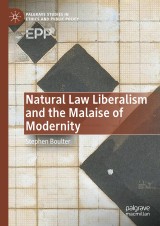Details

Natural Law Liberalism and the Malaise of Modernity
Palgrave Studies in Ethics and Public Policy
|
117,69 € |
|
| Verlag: | Palgrave Macmillan |
| Format: | |
| Veröffentl.: | 22.07.2024 |
| ISBN/EAN: | 9783031597374 |
| Sprache: | englisch |
| Anzahl Seiten: | 384 |
Dieses eBook enthält ein Wasserzeichen.
Beschreibungen
<p>This book examines modernity itself. A single overarching policy recommendation is defended, namely, that the West ought not to defect from modernity’s core commitments to the sciences, market economics and liberal democracy despite the litany of complaints that have been, and continue to be levelled against it. But in addition to this overarching recommendation, numerous policy suggestions are made. The reader will find discussions as wide-ranging as electoral regimes and judicial procedure, banking regulations and the ethics of a modern civil service. What binds these disparate subsidiary recommendations together is that they are designed to meet the challenges facing modernity while remaining true to its core commitments. These subsidiary policy recommendations, in turn, are not developed in an ad hoc manner, but are themselves motivated by a distinct philosophy of modernity which is termed natural law liberalism. </p>
<p>Chapter1: The Malaise of Modernity.- Chapter2: On the various kinds of natural law theory.- Chapter3: On the Various Kinds of Liberalism.- Chapter4: Natural Law Liberalism and Democracy.- Chapter5: Natural Law Liberalism and the Defence of the Rule of Law.- Chapter6: Natural Law Liberalism and Bureaucracy.- Chapter7: Natural Law Liberalism and the Philosophy of Economics.- Chapter8: Natural Law Liberalism and the Financial Sector.- Chapter9: Natural Law Liberalism as a Philosophy of Modernity.</p>
Stephen Boulter is Reader in Philosophy at Oxford Brookes University.
<p>This book examines modernity itself. A single overarching policy recommendation is defended, namely, that the West ought not to defect from modernity’s core commitments to the sciences, market economics and liberal democracy despite the litany of complaints that have been, and continue to be levelled against it. But in addition to this overarching recommendation, numerous policy suggestions are made. The reader will find discussions as wide-ranging as electoral regimes and judicial procedure, banking regulations and the ethics of a modern civil service. What binds these disparate subsidiary recommendations together is that they are designed to meet the challenges facing modernity while remaining true to its core commitments. These subsidiary policy recommendations, in turn, are not developed in an ad hoc manner, but are themselves motivated by a distinct philosophy of modernity which is termed natural law liberalism. </p>
<p><strong>Stephen Boulter</strong> is Reader in Philosophy at Oxford Brookes University.</p>
<p><strong>Stephen Boulter</strong> is Reader in Philosophy at Oxford Brookes University.</p>
Argues that the West ought not to defect from Modernity’s core commitments Encompasses electoral regimes and judicial procedure, banking regulations and the ethics of a modern civil service Motivated by a distinct philosophy of modernity termed natural law liberalism

















